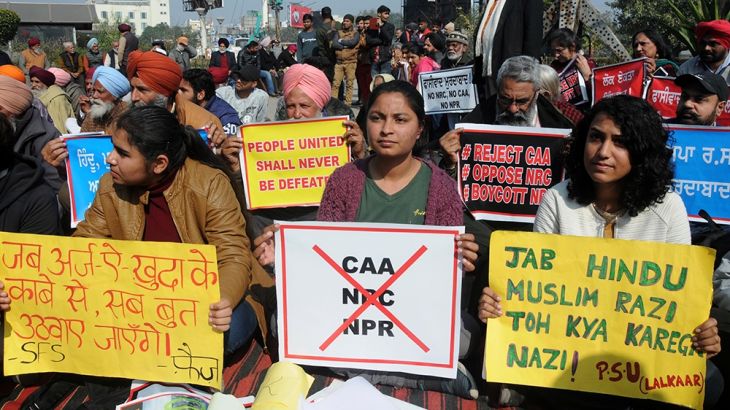India says no plans yet to implement NRC amid continuing protests
The Hindu nationalist government says it is still weighing whether to roll out nationwide NRC amid continuing protests.

India’s Hindu nationalist government has said it is still weighing whether to roll out a nationwide citizenship registry amid continuing protests against a citizenship law that fast-tracks naturalisation for some religious minorities from three neighbouring countries but not Muslims.
The government led by the Bharatiya Janata Party (BJP) announced last November that National Register of Citizens (NRC) will be implemented to identify undocumented immigrants.
Keep reading
list of 3 itemsIndia approves funds for population register amid mass protests
National Register of Citizens: Indians or not Indians?
The official statement on Tuesday, made by MP Nityanand Rai in a written reply to a question in parliament, is a departure from comments made by Prime Minister Narendra Modi’s senior party leaders, including the home minister, Amit Shah.
The BJP’s manifesto for the 2019 national elections, which the party won in a landslide victory, also promised the citizenship registry in India.
Modi, however, recently backed away from the exercise after public pressure mounted with the passage of the controversial Citizenship Amendment Act (CAA). Millions of people have demonstrated in India’s major cities since the law was passed in December.
”They
should also say they are willing to revoke CAA, only then the nationwide protests will stop.”]
The protests have also raised doubts about census exercise expected to be conducted in April, with activists fearing that data from the National Population Register (NPR) can be used to generate NRC.
Opponents of the law say it is discriminatory because it excludes Muslims and unconstitutional because it links faith to citizenship in an officially secular country.
Activists sceptical
Many activists are also sceptical of the government’s statement, accusing the BJP of doublespeak.
“Unfortunately, the government’s words do not carry any conviction, given its history of doublespeak,” Delhi-based activist Yogendra Yadav told Al Jazeera.
“If they are serious about assuring people, why don’t they remove the ancestry related questions from NPR? Why doesn’t the government declare a timeframe about the non-rollout of NRC?”
Lucknow-based activist Sandeep Pandey told Al Jazeera the BJP has an agenda to polarise the society.
“We don’t know whether [the statement] is under pressure from the [anti-CAA] movement,” he said, adding: “But this is also a strategy of the government. They may buckle under pressure for some time but then they do what they want to do in some other form or under some other name.”
“They [BJP] should also say they are willing to revoke CAA, only then the nationwide protests will stop.”
Resistance to CAA and NRC
Many Indian states have refused to implement the NRC exercise saying it is against the constitution, while the CAA has been challenged in the Supreme Court, which has sought an answer from the government.
Critics fear the registry coupled with the new law could leave millions stateless, a fear that government officials have dismissed.
Nearly two million people were excluded from a similar registry Modi’s party implemented in the northeastern state of Assam last year. They have been asked to prove their citizenship in quasi-legal tribunals or else risk being declared foreigner and stripped of rights including to cast a vote.
At least six detention centres are already operation in Assam, while the state is building India’s largest centre to house 3,000 “foreigners”.
Modi has publicly denied that there are any detention centres in the country and has downplayed the protests, saying they are orchestrated by his opponents.
Bilal Kuchay contributed to this report from New Delhi